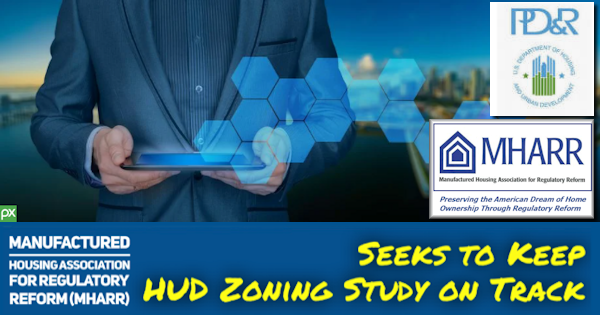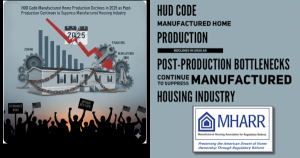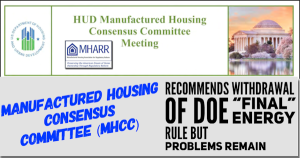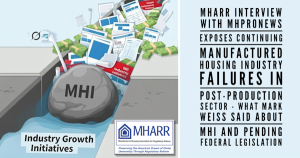MHARR Seeks to Keep HUD Zoning Study on Track

Washington, D.C., January 19, 2021 – The Manufactured Housing Association for Regulatory Reform (MHARR) has filed comments attached with the Office of Management and Budget (OMB) seeking to ensure that a pending HUD study of state and local regulatory barriers to the use and placement of “factory-built” structures is – as it should be — properly focused on discriminatory and exclusionary edicts targeting affordable, federally-regulated mainstream manufactured housing. MHARR’s comments were filed in connection with a December 18, 2020 HUD request for OMB approval of “information collection” pertaining to such a study.
A HUD study of the negative impacts flowing specifically from discriminatory zoning edicts that either exclude or severely restrict the placement of affordable HUD Code manufactured homes in many communities, was sought by MHARR in an April 4, 2019 meeting with officials of HUD’s Office of Policy Development and Research (PD&R), and in a subsequent April 24, 2019 request to HUD Secretary Ben Carson. MHARR, in making this request, emphasized that discriminatory land use, zoning and placement restrictions and exclusion laws – together with the complete absence of federal securitization and secondary market support for manufactured housing personal property loans — are key drivers in keeping inherently affordable manufactured homes out of large areas of the United States while simultaneously depriving millions of moderate and lower-income Americans of the affordable homeownership that they need and want. This has had devastating consequences not only for the availability of affordable housing and homeownership for American families, but for the industry as well (and most particularly its post-production sector), which has seen production and sales levels fall far below its historic baseline over the past decade-plus.
MHARR reasoned that a specific and definitive study of this type could be an important step in its ongoing effort to advance the full and proper implementation of both the enhanced federal preemption provision of the 2000 reform law, and the Duty to Serve Underserved Markets (DTS) mandate of the Housing and Economic Recovery Act of 2008 (HERA). Enhanced federal preemption, designed to invalidate state and local “requirements” that broadly interfere with federal superintendence of federally-regulated manufactured homes according to the full purposes of the 2000 reform law – and not just conflicting state and local construction standards, as had been the case before – was specifically included in the 2000 reform law to prevent the discriminatory exclusion of manufactured housing via zoning edicts, but has been baselessly ignored by HUD for two decades. Meanwhile, DTS was enacted to ensure market-significant support for all types of manufactured housing consumer loans but, after more than a decade, has not been implemented at all with respect to the personal property loans which represent nearly 80% of the entire mainstream manufactured housing market. At the same time, the industry’s largest corporate conglomerates have arguably sought to divert the focus of DTS from mainstream, affordable manufactured housing, to significantly more costly types of “factory-built” homes, by going outside of the manufactured housing mainstream and using confusing names and designation instead of ‘federally regulated manufactured housing.”
MHARR, therefore, as its comments stress, is extremely concerned that the overly and unnecessarily broad language of HUD’s request, referring to “factory-built structures” rather than “federally-regulated manufactured homes” (similar to what Fannie Mae, Freddie Mac and industry conglomerates have done with DTS), could be misused to either shift the focus of this information collection and study away from affordable, mainstream HUD code manufactured housing – where it should be – or otherwise skew or undermine the results (and value) of such a crucial study by including other types of unrelated, much more costly “factory-built” homes that fall outside the ambit of mainstream, affordable, federally-regulated manufactured housing. MHARR’s comments, accordingly, call on OMB to ensure that any authorization for HUD’s information collection and related study are specifically targeted at mainstream, affordable, federally regulated manufactured housing and not other types of unrelated, so-called factory-built structures. Without such a specifically targeted focus on mainstream, affordable federally regulated manufactured homes, a study of this type could not only fail to establish the factual bases needed to push-forward the full implementation of enhanced federal preemption but could actually harm that effort with further highly negative consequences for both the industry and moderate and lower-income American consumers of affordable housing. Put simply, OMB cannot allow this information collection and related HUD study to be “hijacked” for purposes hostile to affordable, mainstream manufactured housing.
MHARR will continue to closely monitor activity affecting this study in an effort to ensure that its value and legitimacy is not compromised in relation to the 2000 reform law.
The Manufactured Housing Association for Regulatory Reform is a Washington, D.C.-based national trade association representing the views and interests of independent producers of federally regulated manufactured housing.

Washington, D.C., January 19, 2021 – The Manufactured Housing Association for Regulatory Reform (MHARR) has filed comments attached with the Office of Management and Budget (OMB) seeking to ensure that a pending HUD study of state and local regulatory barriers to the use and placement of “factory-built” structures is – as it should be — properly focused on discriminatory and exclusionary edicts targeting affordable, federally-regulated mainstream manufactured housing. MHARR’s comments were filed in connection with a December 18, 2020 HUD request for OMB approval of “information collection” pertaining to such a study.
A HUD study of the negative impacts flowing specifically from discriminatory zoning edicts that either exclude or severely restrict the placement of affordable HUD Code manufactured homes in many communities, was sought by MHARR in an April 4, 2019 meeting with officials of HUD’s Office of Policy Development and Research (PD&R), and in a subsequent April 24, 2019 request to HUD Secretary Ben Carson. MHARR, in making this request, emphasized that discriminatory land use, zoning and placement restrictions and exclusion laws – together with the complete absence of federal securitization and secondary market support for manufactured housing personal property loans — are key drivers in keeping inherently affordable manufactured homes out of large areas of the United States while simultaneously depriving millions of moderate and lower-income Americans of the affordable homeownership that they need and want. This has had devastating consequences not only for the availability of affordable housing and homeownership for American families, but for the industry as well (and most particularly its post-production sector), which has seen production and sales levels fall far below its historic baseline over the past decade-plus.
MHARR reasoned that a specific and definitive study of this type could be an important step in its ongoing effort to advance the full and proper implementation of both the enhanced federal preemption provision of the 2000 reform law, and the Duty to Serve Underserved Markets (DTS) mandate of the Housing and Economic Recovery Act of 2008 (HERA). Enhanced federal preemption, designed to invalidate state and local “requirements” that broadly interfere with federal superintendence of federally-regulated manufactured homes according to the full purposes of the 2000 reform law – and not just conflicting state and local construction standards, as had been the case before – was specifically included in the 2000 reform law to prevent the discriminatory exclusion of manufactured housing via zoning edicts, but has been baselessly ignored by HUD for two decades. Meanwhile, DTS was enacted to ensure market-significant support for all types of manufactured housing consumer loans but, after more than a decade, has not been implemented at all with respect to the personal property loans which represent nearly 80% of the entire mainstream manufactured housing market. At the same time, the industry’s largest corporate conglomerates have arguably sought to divert the focus of DTS from mainstream, affordable manufactured housing, to significantly more costly types of “factory-built” homes, by going outside of the manufactured housing mainstream and using confusing names and designation instead of ‘federally regulated manufactured housing.”
MHARR, therefore, as its comments stress, is extremely concerned that the overly and unnecessarily broad language of HUD’s request, referring to “factory-built structures” rather than “federally-regulated manufactured homes” (similar to what Fannie Mae, Freddie Mac and industry conglomerates have done with DTS), could be misused to either shift the focus of this information collection and study away from affordable, mainstream HUD code manufactured housing – where it should be – or otherwise skew or undermine the results (and value) of such a crucial study by including other types of unrelated, much more costly “factory-built” homes that fall outside the ambit of mainstream, affordable, federally-regulated manufactured housing. MHARR’s comments, accordingly, call on OMB to ensure that any authorization for HUD’s information collection and related study are specifically targeted at mainstream, affordable, federally regulated manufactured housing and not other types of unrelated, so-called factory-built structures. Without such a specifically targeted focus on mainstream, affordable federally regulated manufactured homes, a study of this type could not only fail to establish the factual bases needed to push-forward the full implementation of enhanced federal preemption but could actually harm that effort with further highly negative consequences for both the industry and moderate and lower-income American consumers of affordable housing. Put simply, OMB cannot allow this information collection and related HUD study to be “hijacked” for purposes hostile to affordable, mainstream manufactured housing.
MHARR will continue to closely monitor activity affecting this study in an effort to ensure that its value and legitimacy is not compromised in relation to the 2000 reform law.
The Manufactured Housing Association for Regulatory Reform is a Washington, D.C.-based national trade association representing the views and interests of independent producers of federally regulated manufactured housing.













